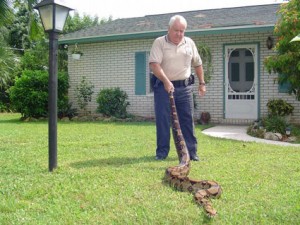
Vero Beach, FL – After a study conducted by the U.S. Geological Survey suggested that the Burmese python and eight other species of constrictor snakes as injurious wildlife under the Lacey Act, the Fish and Wildlife Service has taken steps to ban the importation as well as distribution of these snakes across states lines. Violators would be subject to penalties of six months in prison and $5,000 fine.
At risk is the region in South Florida, including the Everglades, where it is believed that thousands of Burmese pythons and the other constrictors are putting already-imperiled species at greater risk. There are no distinct predators for these snakes, and they have easily adapted to the environment where food is plentiful and the climate is perfect.
From the U.S.G.S assessment – “The nine include the world’s four largest snake species (Green Anaconda, Eunectes murinus; Indian or Burmese Python, Python molurus; Northern African Python, Python sebae; and Reticulated Python, Broghammerus reticulatus) , the Boa Constrictor (Boa constrictor), and four species that are ecologically or visually similar to one of the above (Southern African Python, Python natalensis; Yellow Anaconda, Eunectes notaeus; DeSchauensee’s Anaconda, Eunectes deschauenseei; and Beni Anaconda, Eunectes beniensis).”
The most damning part of the report states “At present, the only probable pathway by which these species would become established in the United States is the pet trade.”
Snake owners and collectors around the United States are outraged by what they see as a drastic over-step, viewed as a shotgun approach for a problem that needs more attention. Pet shop owners like Rick Preuss, owner of Preuss Pets of Old Towne, Michigan, do not see why the restrictions should exist for his shop, in a state where such snakes would not be able to survive the brutally cold climate and therefore not disrupt the ecosystem.
James Harding, a herpetologist at Michigan State University said, “It (the science) is badly flawed. The large constricting snakes will never be a problem in Michigan because they can’t survive our winters.”
The U.S. Association of Reptile Keepers has filed objections with the Department of The Interior and has suggested in will bring legal action if necessary to block the ban. The reptile industry is an estimated $3 billion per year business, which includes breeders, shop owners, equipment makers, and food providers. In an economy already under strain this ban could create more job losses. “The number of jobs it produces is significant,” Harding said. “Any kind of federal legislation has to take into account not only ecological but also economic impacts.”
Shop owners like Preuss believe that identity options used with dogs and cats could be equally effective with reptiles. “If there are issues for potential injuries or even environmental risks, you put the responsibilities upon the owners,” Preuss said.The law could be changed to require snake owners to plant microchips in their pet containing owner information. This would make the snake easier to identify and track.
Final decisions on the ban are still under consideration, with a final decision slated to be issued later this year.






To the man who owns a Michigan pet shop that handles snakes; the idiots who buy these snakes that out grow their ability to care for them Or out grow a law on the books will HAPPILY drive their pet to Mississippi to let their beloved establish a new home in a place where HE or SHE can survive and multiply… It’s a faulty argument!
Then have STATE regulations in those states where large constrictors are actually ABLE to thrive and make ANY actual impact on on native fauna and wildlife. There’s NO reason why why someone who responsibly breeds or raises these snakes shouldn’t be able to send an animal to say Montana…! Let alone from Colorodo or some region they couldn’t POSSIBLY survive to likewise region. VERY FEW places in this country could ANY of those species listed survive, LET ALONE have the right weather and habitat conditions to breed…! Few select Southeastern US regions are the rare exceptions. Period. I knew a family with german sheppards they could NOT keep from wanting to eat EVERYONES face. Should we place the same laws for these DOGS because of irresposible owners? How about PIGS…? Feral hogs are doing FAR more damage across a HUGE expanse of our country, and they can thrive in almost EVERY region we have. Ban pigs…? Hmmmm…. no more mcdonalds bacon mcmuffins :0P
Comments are closed.